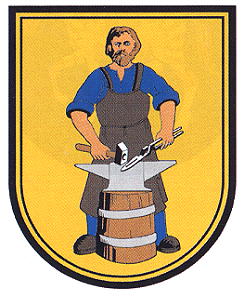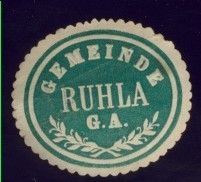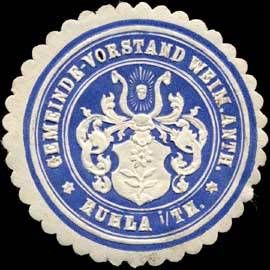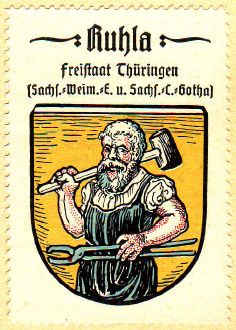Ruhla: Difference between revisions
Knorrepoes (talk | contribs) No edit summary |
Knorrepoes (talk | contribs) m (Text replacement - "↵↵'''" to "'''") Tags: Mobile edit Mobile web edit |
||
| (32 intermediate revisions by the same user not shown) | |||
| Line 1: | Line 1: | ||
<seo title="Wappen von Ruhla" titlemode="append"></seo>'''RUHLA''' | |||
'''RUHLA''' | |||
State : [[Thüringen]]<br/> | State : [[Thüringen]]<br/> | ||
| Line 11: | Line 5: | ||
Additions : 1994 Kittelsthal, Thal | Additions : 1994 Kittelsthal, Thal | ||
[[File:ruhla.jpg|center]] | [[File:ruhla.jpg|center|alt=Wappen von {{PAGENAME}}/Arms (crest) of {{PAGENAME}}]] | ||
====Origin/meaning | {| class="wikitable" | ||
Ruhla was divided in 1640 between Sachsen-Weimar and Sachsen-Gotha. The Sachsen-Weimer part received city rights in 1896 and used as arms a rising sunflower. The Sachsen-Gotha used in its seals a smith, taken from a local legend. When on November 30, 1927 the two cities were again united the common seal showed a smith, but without anvil. The present arms were designed in the middle of the 20<sup>th</sup> century. | |+Official blazon | ||
|- | |||
|'''German''' | |||
| In Gold ein Schmied hinter einem Amboss stehend, in der Rechten einen Schmiedehammer, in der Linken mit einer Schmiedezange eine Klinge haltend, beides auf dem Amboss aufliegend; der Schmied ist bekleidet mit blauem Hemd, blauer Hose und dunkler Schürze. | |||
|- | |||
|'''English''' | |||
| blazon wanted | |||
|} | |||
===Origin/meaning=== | |||
Ruhla was divided in 1640 between Sachsen-Weimar and Sachsen-Gotha. The Sachsen-Weimer part received city rights in 1896 and used as arms a rising sunflower, see seal below. The Sachsen-Gotha used in its seals a smith, taken from a local legend. When on November 30, 1927 the two cities were again united the common seal showed a smith, but without anvil. The present arms were designed in the middle of the 20<sup>th</sup> century. | |||
{|align="center" | {|align="center" | ||
|align="center"|[[File:ruhlaz1.jpg|center]] <br/>Seal from around 1900 | |align="center"|[[File:ruhlaz1.jpg|center|Seal of {{PAGENAME}}]] <br/>Seal from around 1900 from the Gotha part | ||
|align="center"|[[File:ruhla.hagd.jpg|center]] <br/>The arms in the [[Kaffee Hag albums]] +/- 1925 | |align="center"|[[File:ruhlaz2.jpg|center|Seal of {{PAGENAME}}]] <br/>Seal from around 1900 from the Weimar part | ||
|align="center"|[[File:ruhla.hagd.jpg|center|Wappen von {{PAGENAME}}/Coat of arms (crest) of {{PAGENAME}}]] <br/>The arms by [[Otto Hupp|Hupp]] in the [[Kaffee Hag albums]] +/- 1925 | |||
|} | |} | ||
[[Literature]] : Hupp, O: [[Kaffee Hag albums]], 1920s; Benzing et al, 1984; Ulle, 1998 | |||
{{de}} | |||
{{media}} | |||
[[Civic Heraldry Literature - Germany|'''Literature''']]: Hupp, O: [[Kaffee Hag albums]], 1920s; Benzing et al, 1984; Ulle, 1998 | |||
[[Category:German Municipalities R]] | [[Category:German Municipalities R]] | ||
[[Category:Thüringen]] | [[Category:Thüringen]] | ||
[[Category:Wartburgkreis]] | [[Category:Wartburgkreis]] | ||
Latest revision as of 14:51, 7 January 2024
RUHLA
State : Thüringen
District (Kreis) : Wartburgkreis
Additions : 1994 Kittelsthal, Thal
| German | In Gold ein Schmied hinter einem Amboss stehend, in der Rechten einen Schmiedehammer, in der Linken mit einer Schmiedezange eine Klinge haltend, beides auf dem Amboss aufliegend; der Schmied ist bekleidet mit blauem Hemd, blauer Hose und dunkler Schürze. |
| English | blazon wanted |
Origin/meaning
Ruhla was divided in 1640 between Sachsen-Weimar and Sachsen-Gotha. The Sachsen-Weimer part received city rights in 1896 and used as arms a rising sunflower, see seal below. The Sachsen-Gotha used in its seals a smith, taken from a local legend. When on November 30, 1927 the two cities were again united the common seal showed a smith, but without anvil. The present arms were designed in the middle of the 20th century.
| Seal from around 1900 from the Gotha part |
Seal from around 1900 from the Weimar part |
The arms by Hupp in the Kaffee Hag albums +/- 1925 |
This page is part of the German heraldry portal |
Heraldry of the World |
|
German heraldry:
|
Selected collector's items from Germany:
|
Contact and Support
Partners:
Your logo here ?
Contact us
© since 1995, Heraldry of the World, Ralf Hartemink 
Index of the site
Literature: Hupp, O: Kaffee Hag albums, 1920s; Benzing et al, 1984; Ulle, 1998















